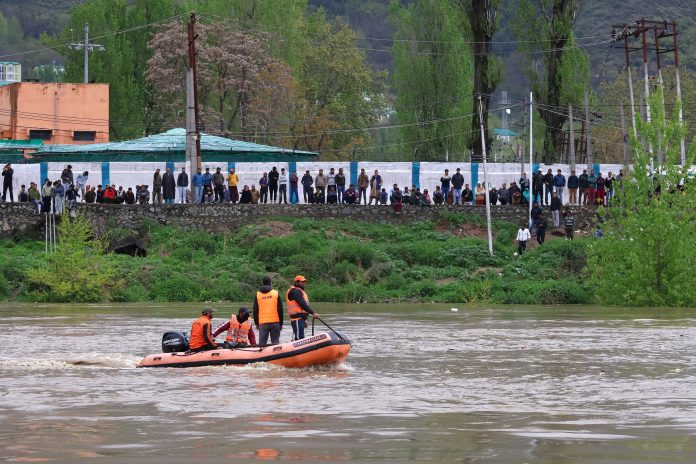The recent boat capsizing tragedy in Srinagar, claiming the lives of six individuals and leaving three others missing, is not just a random accident; it’s a stark reminder of the consequences of delayed infrastructure projects and their impact on human lives. The incomplete Gandbal Bridge, persisting for over a decade, stands as a symbol of bureaucratic inefficiency and administrative negligence. The heart-wrenching incident on the outskirts of Srinagar unfolded due to a series of unfortunate events triggered by the lack of a fully operational bridge. Locals, compelled to cross the swollen Jhelum River, had no choice but to rely on a boat, ultimately leading to a catastrophic outcome. As the boat detached from the supporting rope and collided with one of the bridge’s pillars, lives were lost, families were shattered and a community plunged into mourning.
In the aftermath of this tragedy, grief is not the only sentiment reverberating through the valley; there is also frustration and anger directed towards the authorities responsible for the delayed completion of critical infrastructure projects. The incomplete Gandbal bridge serves as a poignant symbol of official apathy, leaving residents vulnerable and exposed to perilous situations. Authorities must understand that the consequences of incomplete infrastructure extend far beyond inconvenience; they can be a matter of life and death. The anguish and despair experienced by the families of the victims are a testament to the urgency of addressing these issues. The voices of the locals, echoing sentiments of frustration and disappointment, cannot be ignored. Their demands for accountability and action are not unreasonable; they are born out of necessity and a desire for a safer, more secure future. Local’s assertion that timely completion of essential infrastructure could have prevented this tragedy resonates with many who have long awaited relief from the burdens imposed by inadequate facilities.
It is imperative to conduct an immediate audit to assess the reasons for the prolonged delays in completing such vital projects. After a thorough analysis of the cited reasons, concerted efforts must be made to address all bottlenecks promptly. Priority should be given to projects that directly impact the lives of citizens, particularly those involving bridges and essential transportation infrastructure. Adequate funds should be promptly allocated and clear timelines should be established for the completion of these projects. Individuals responsible for contributing to delays must be held accountable, setting a precedent for future adherence to project timelines and efficient execution. In this digital era, the continued reliance on boats for students to access schools, especially across flooded rivers even in urban areas, is deeply concerning and warrants immediate attention. Moreover, it is now important to conduct a comprehensive survey to identify all such vulnerable areas requiring improved infrastructure, especially bridges. Following a detailed assessment, measures should be promptly implemented to provide proper bridges and infrastructure to safeguard the lives and well-being of citizens.
The tragedy in Srinagar serves as a wake-up call for authorities. It’s a reminder that the cost of inaction far outweighs the challenges of completing stalled projects. Every day of delay is another day of heightened risk for communities living on the edge of uncertainty. The concerns raised by communities living in areas with incomplete infrastructure cannot be brushed aside. At this juncture, all the stalled projects demand immediate attention and swift action. It’s time for the authorities to prioritise the welfare of citizens over bureaucratic hurdles.


